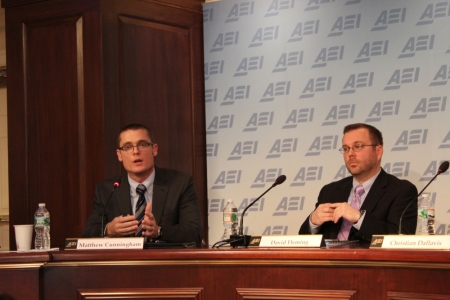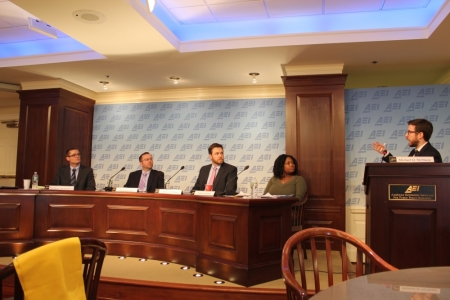Should Christian Schools Prepare Students for College or Heaven?
 2 photos(Photo Credit: The Christian Post/Tyler O'Neil)Micahel Q. McShane, research fellow in education policy studies at the American Enterprise Institute (AEI) addresses the crowd to discuss education in faith-based K-12 schools at AEI on Thursday, January 30, 2014.
2 photos(Photo Credit: The Christian Post/Tyler O'Neil)Micahel Q. McShane, research fellow in education policy studies at the American Enterprise Institute (AEI) addresses the crowd to discuss education in faith-based K-12 schools at AEI on Thursday, January 30, 2014.WASHINGTON – Catholic school experts discussed the twin goals of education reform at religious private schools, arguing that faith formation and high academic standards are equally important to a school's success.
"We're in the business of educating not just citizens but saints," Christian Dallavis, senior director of Leadership Programs at The University of Notre Dame's Alliance for Catholic Education, declared at an event at the American Enterprise Institute on Thursday.
"If your goals are college and heaven, one of those is going to be easier to measure," quipped Michael Q. McShane, research fellow in education policy studies at AEI. McShane moderated a panel involving Dallavis and three other experts.
The experts discussed the success and failure of recent K-12 private school reforms, in both Christian and secular schools. Tiffany Forrester, director of Policy and Research at The Black Alliance for Educational Options, argued that the main obstacle to "school choice" initiatives is the vehement opposition of critics who do not believe private schools educate children well.
Proving Private Schools Work
"The critics first try to not allow the legislation to be passed, then they try to water it down, then they devalue the program while it's being implemented," Forrester explained. In order to overcome these attacks, school choice proponents must "show that these schools are adequately educating our children and giving them high-quality options."
Dallavis pointed to the success of his ACE program, which helps struggling Catholic private schools, in the past few years. In 2011, only 29 percent of the program's 3rd graders were reading at grade level, while 40 percent could perform grade level math. By 2013, 64 percent of 3rd grade students were reading at grade level and 71 percent were doing math at grade level. Last year's Kindergarten class tested in the 91st percentile for reading and 86th percentile for math.
"In a neighborhood where many children do not expect to graduate from high school, the 5-year-olds in the Notre Dame ACE Academies are among the top 10 and 15 percent in the country in reading and math, respectively," Dallavis explained. These achievements occurred "on the south side of Tucson, the sixth poorest area in the United States."
The Benefits of Religious Over Secular Schools
Religious schools "can reach out to lower income students" to prioritize "social justice and evangelization," argued David Fleming, assistant professor of Political Science at Furman University. Fleming compared secular and religious schools in Milwaukee through the Milwaukee Parental Choice Program, the first voucher program in the U.S. for disadvantaged students.
While religious schools were not even allowed to participate when MPCP started in 1990, the city allowed them to enter the program in 1998. By the 2012-2013 school year, 85 percent (96 out of 113) of the voucher schools were religious and educated 87 percent of voucher students, an increase from the 67 percent of students in 1998-1999.
Nonsectarian schools in the MPCP decreased from 38 schools in 2005-2006 to 14 in 2012-2013. The decrease coincides with the implementation of new regulations, but many of the nonsectarian schools also had lower academic performance levels, Fleming explained. He argued that, while non-religious schools may prove "faster and better able to respond to changes in the market," and focus on niche markets like art or Science, Technology, Engineering, and Math (STEM), parents generally prefer the religion component.
Educating Students for Heaven?

Matthew Cunningham, a doctoral student in Education Leadership for Social Justice at Loyola Marymount University, argued that Catholic private school teachers do not even question the fact that they get smaller paychecks. "There are many aspects of Catholic education that are attractive, and I think people are willing to make the sacrifice," Cunningham explained. "Most of them don't even question it," because everyone is working toward the students' well-being.
Cunningham delved into the secondary education program at Loyola Marymount University Los Angeles, which has graduated over 1,500 Catholic teachers and principals since 2001. The top goal, he explained, is to "implement a faith-based education."
Dallavis declared that he would like to measure ACE success by seeing "how many kids have been canonized saints from one of these schools in 100 years."
Necessary Reforms

Fleming pointed out that there are a "declining number of priests and nuns who are willing to work for very little money – they'll get the rewards in heaven, I guess," he quipped, to laughter from the audience. He cited a recent survey of Catholic schools which shows that tuition covers only 60 percent of the cost to educate elementary students and only 80 percent of the cost to educate those in high school.
Dallavis argued that, while money is part of the solution, schools need something else as well. "We have to change the job description of what it means to be a principal from being an administrator to leading a school community," he said. ACE helps the pastor, the bishop, the superintendent, and other members of the community fulfill different roles in school administration.





















